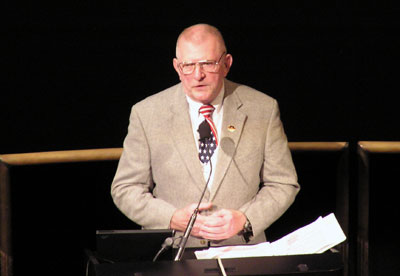“We must never fail”: Gene Kranz, Apollo 13, and the futureby Jeff Foust
|
| “Chemistry leads to communication that is virtually intuitive, because we must know when the person next to us needs help, a few more seconds to come up with an answer.” |
During the early days of the US space program, that chemistry had to develop quickly as a diverse set of people, ranging from engineers fresh out of college to former test pilots were thrown together with a directive from the nation to safely and successfully launch humans into space. “In those days, many of us came in from aircraft flight testing, and our egos were much bigger than this auditorium,” he said. “It was tough to get people to work together, but we knew that success would only come as a team, so we became one, and we learned to check our egos at the door.”
Kranz and his colleagues could be excused for having an ego by the mid-1960s, after a string of successes—although not without a number of close calls—put NASA firmly on the course for a manned lunar landing by the end of the decade. Then Apollo 1 occurred. “And with [the Apollo 1 crew’s] death came anger,” Kranz recalled, “anger at ourselves, because we knew we were responsible for America’s first space disaster.”
“We wrote two more words into our vocabulary in mission control” after the accident, he said, “tough and competent. Tough because we will never again shirk from our responsibilities because we’re forever accountable for what we do, or what we fail to do. Competent, because we will never again take anything for granted, we will never stop learning. From now on the teams in mission control will be perfect… As a team, we must never fail.”
It was that commitment to success—the origins of “failure is not an option”—that guided that first “return to flight” in the late 1960s with Apollo, leading to the success of Apollo 11 and also the rescue of Apollo 13. It was the teamwork that had been forged in mission control over the years that helped made that rescue possible. He recalled an effort during one phase of the rescue to put the spacecraft into a “barbecue roll” to ensure the spacecraft was evenly heated by the Sun. The effort required close coordination of the mission controllers, who had to step through the process again when an initial effort to put the spacecraft into the roll failed. “This was probably one of the finest examples of real-time teamwork I’d ever seen,” he said.
Later, controllers had to develop an intricate 500-step checklist for powering the command module back up in preparation for reentry, revising it several times in the hours leading up to the spacecraft’s return to Earth. “The amazing thing was when we executed these procedures they were absolutely perfect: there was not one item we missed when we debriefed after the mission.”
| “At times there’s been a lot of discussion about this thing called ‘culture’. Culture is the legacy of the leaders, and leadership starts at the top.” |
One of the noteworthy aspects of this success was that it was accomplished with a relatively young group of people: most of those working in mission control were in the early to mid 20s, just a few years out of college. Among the flight directors Kranz, 37 at the time of Apollo 13, was the elder statesman of the group. Kranz and many of the other flight directors had experience as fighter pilots. “I believe that this kind of background, flying the aircraft in the late subsonic/early supersonic era, really provided us with the background we needed to work the problems we saw on this mission,” he said.
So, what can the past teach us about the future? Kranz, who retired from NASA over a decade ago, said he had been back to mission control since the Columbia accident to review training, including “the process by which they attempt to resolve these very gray, very ambiguous areas” during the course of a mission. In general, though, he sees little change in the quality and dedication of mission control teams today compared to the ones he led during the height of the Space Race. “I believe the control teams are as dedicated today, and that the mid-level management is certainly superb,” he said. “At times there’s been a lot of discussion about this thing called ‘culture’. Culture is the legacy of the leaders, and leadership starts at the top. I believe if there issues associated with culture, it is really one of more a leadership component, and that’s direction where we have to look if we see problems, if we see difficulties.”
Kranz, for one, is a big believer in a return to human exploration of space. “I believe we are going to move into a new era of American space leadership,” he said during a question-and-answer session after his talk. “We have the young people, we have the technologies, we have the know-how. We have to solve a few problems associated with the economic base of our country, and we need to develop a long-term commitment, because it’s going to require a long-term commitment, it’s going to be an international commitment, but I believe that we will get on the road back to the Moon and Mars in many of your lifetimes.”
